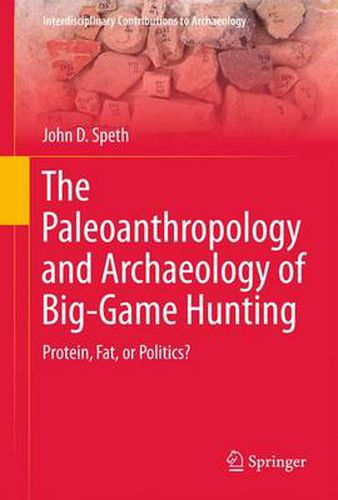Readings Newsletter
Become a Readings Member to make your shopping experience even easier.
Sign in or sign up for free!
You’re not far away from qualifying for FREE standard shipping within Australia
You’ve qualified for FREE standard shipping within Australia
The cart is loading…






This title is printed to order. This book may have been self-published. If so, we cannot guarantee the quality of the content. In the main most books will have gone through the editing process however some may not. We therefore suggest that you be aware of this before ordering this book. If in doubt check either the author or publisher’s details as we are unable to accept any returns unless they are faulty. Please contact us if you have any questions.
Since its inception, paleoanthropology has been closely wedded to the idea that big-game hunting by our hominin ancestors arose, first and foremost, as a means for acquiring energy and vital nutrients. This assumption has rarely been questioned, and seems intuitively obvious-meat is a nutrient-rich food with the ideal array of amino acids, and big animals provide meat in large, convenient packages. Through new research, the author of this volume provides a strong argument that the primary goals of big-game hunting were actually social and political-increasing hunter’s prestige and standing-and that the nutritional component was just an added bonus.
Through a comprehensive, interdisciplinary research approach, the author examines the historical and current perceptions of protein as an important nutrient source, the biological impact of a high-protein diet and the evidence of this in the archaeological record, and provides a compelling reexamination of this long-held conclusion.
This volume will be of interest to researchers in Archaeology, Evolutionary Biology, and Paleoanthropology, particularly those studying diet and nutrition.
$9.00 standard shipping within Australia
FREE standard shipping within Australia for orders over $100.00
Express & International shipping calculated at checkout
This title is printed to order. This book may have been self-published. If so, we cannot guarantee the quality of the content. In the main most books will have gone through the editing process however some may not. We therefore suggest that you be aware of this before ordering this book. If in doubt check either the author or publisher’s details as we are unable to accept any returns unless they are faulty. Please contact us if you have any questions.
Since its inception, paleoanthropology has been closely wedded to the idea that big-game hunting by our hominin ancestors arose, first and foremost, as a means for acquiring energy and vital nutrients. This assumption has rarely been questioned, and seems intuitively obvious-meat is a nutrient-rich food with the ideal array of amino acids, and big animals provide meat in large, convenient packages. Through new research, the author of this volume provides a strong argument that the primary goals of big-game hunting were actually social and political-increasing hunter’s prestige and standing-and that the nutritional component was just an added bonus.
Through a comprehensive, interdisciplinary research approach, the author examines the historical and current perceptions of protein as an important nutrient source, the biological impact of a high-protein diet and the evidence of this in the archaeological record, and provides a compelling reexamination of this long-held conclusion.
This volume will be of interest to researchers in Archaeology, Evolutionary Biology, and Paleoanthropology, particularly those studying diet and nutrition.